ECO mode MAZDA MODEL CX-9 2009 Owners Manual (in English)
[x] Cancel search | Manufacturer: MAZDA, Model Year: 2009, Model line: MODEL CX-9, Model: MAZDA MODEL CX-9 2009Pages: 538, PDF Size: 12.18 MB
Page 3 of 538
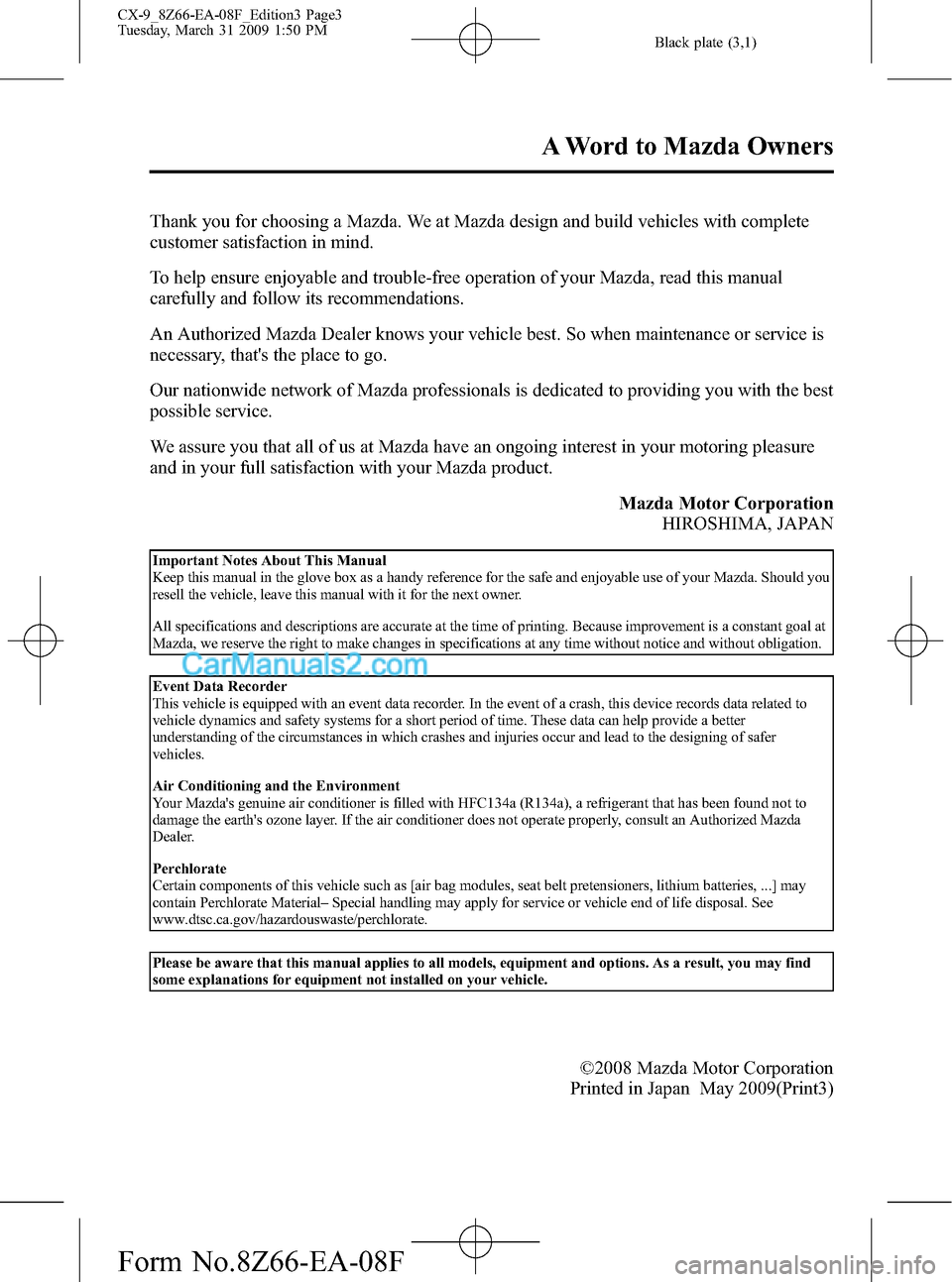
Black plate (3,1)
Thank you for choosing a Mazda. We at Mazda design and build vehicles with complete
customer satisfaction in mind.
To help ensure enjoyable and trouble-free operation of your Mazda, read this manual
carefully and follow its recommendations.
An Authorized Mazda Dealer knows your vehicle best. So when maintenance or service is
necessary, that's the place to go.
Our nationwide network of Mazda professionals is dedicated to providing you with the best
possible service.
We assure you that all of us at Mazda have an ongoing interest in your motoring pleasure
and in your full satisfaction with your Mazda product.
Mazda Motor Corporation
HIROSHIMA, JAPAN
Important Notes About This Manual
Keep this manual in the glove box as a handy reference for the safe and enjoyable use of your Mazda. Should you
resell the vehicle, leave this manual with it for the next owner.
All specifications and descriptions are accurate at the time of printing. Because improvement is a constant goal at
Mazda, we reserve the right to make changes in specifications at any time without notice and without obligation.
Event Data Recorder
This vehicle is equipped with an event data recorder. In the event of a crash, this device records data related to
vehicle dynamics and safety systems for a short period of time. These data can help provide a better
understanding of the circumstances in which crashes and injuries occur and lead to the designing of safer
vehicles.
Air Conditioning and the Environment
Your Mazda's genuine air conditioner is filled with HFC134a (R134a), a refrigerant that has been found not to
damage the earth's ozone layer. If the air conditioner does not operate properly, consult an Authorized Mazda
Dealer.
Perchlorate
Certain components of this vehicle such as [air bag modules, seat belt pretensioners, lithium batteries, ...] may
contain Perchlorate Material–Special handling may apply for service or vehicle end of life disposal. See
www.dtsc.ca.gov/hazardouswaste/perchlorate.
Please be aware that this manual applies to all models, equipment and options. As a result, you may find
some explanations for equipment not installed on your vehicle.
©2008 Mazda Motor Corporation
Printed in Japan May 2009(Print3)
A Word to Mazda Owners
CX-9_8Z66-EA-08F_Edition3 Page3
Tuesday, March 31 2009 1:50 PM
Form No.8Z66-EA-08F
Page 13 of 538
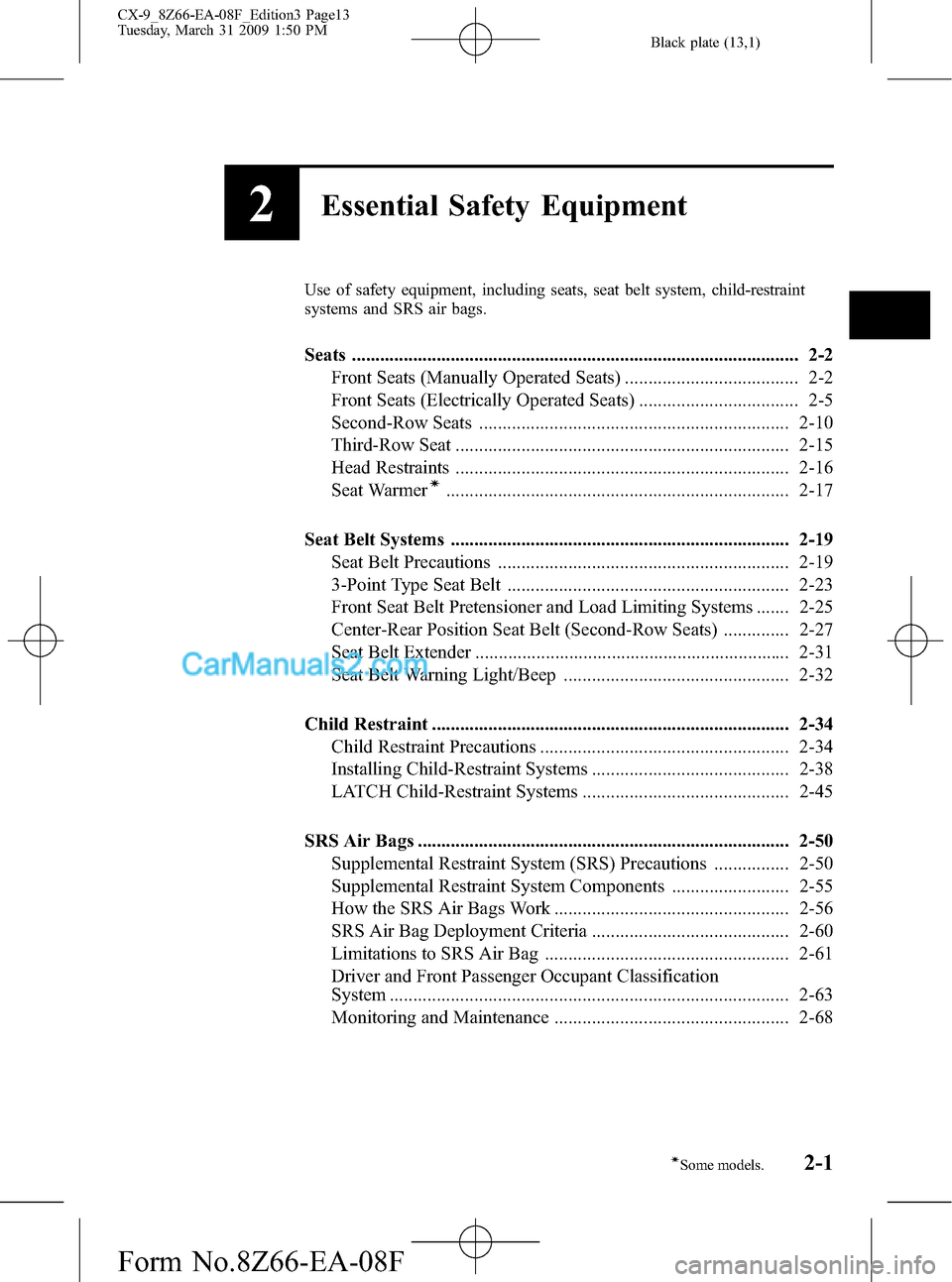
Black plate (13,1)
2Essential Safety Equipment
Use of safety equipment, including seats, seat belt system, child-restraint
systems and SRS air bags.
Seats ............................................................................................... 2-2
Front Seats (Manually Operated Seats) ..................................... 2-2
Front Seats (Electrically Operated Seats) .................................. 2-5
Second-Row Seats .................................................................. 2-10
Third-Row Seat ....................................................................... 2-15
Head Restraints ....................................................................... 2-16
Seat Warmer
í......................................................................... 2-17
Seat Belt Systems ........................................................................ 2-19
Seat Belt Precautions .............................................................. 2-19
3-Point Type Seat Belt ............................................................ 2-23
Front Seat Belt Pretensioner and Load Limiting Systems ....... 2-25
Center-Rear Position Seat Belt (Second-Row Seats) .............. 2-27
Seat Belt Extender ................................................................... 2-31
Seat Belt Warning Light/Beep ................................................ 2-32
Child Restraint ............................................................................ 2-34
Child Restraint Precautions ..................................................... 2-34
Installing Child-Restraint Systems .......................................... 2-38
LATCH Child-Restraint Systems ............................................ 2-45
SRS Air Bags ............................................................................... 2-50
Supplemental Restraint System (SRS) Precautions ................ 2-50
Supplemental Restraint System Components ......................... 2-55
How the SRS Air Bags Work .................................................. 2-56
SRS Air Bag Deployment Criteria .......................................... 2-60
Limitations to SRS Air Bag .................................................... 2-61
Driver and Front Passenger Occupant Classification
System ..................................................................................... 2-63
Monitoring and Maintenance .................................................. 2-68
2-1íSome models.
CX-9_8Z66-EA-08F_Edition3 Page13
Tuesday, March 31 2009 1:50 PM
Form No.8Z66-EA-08F
Page 29 of 538
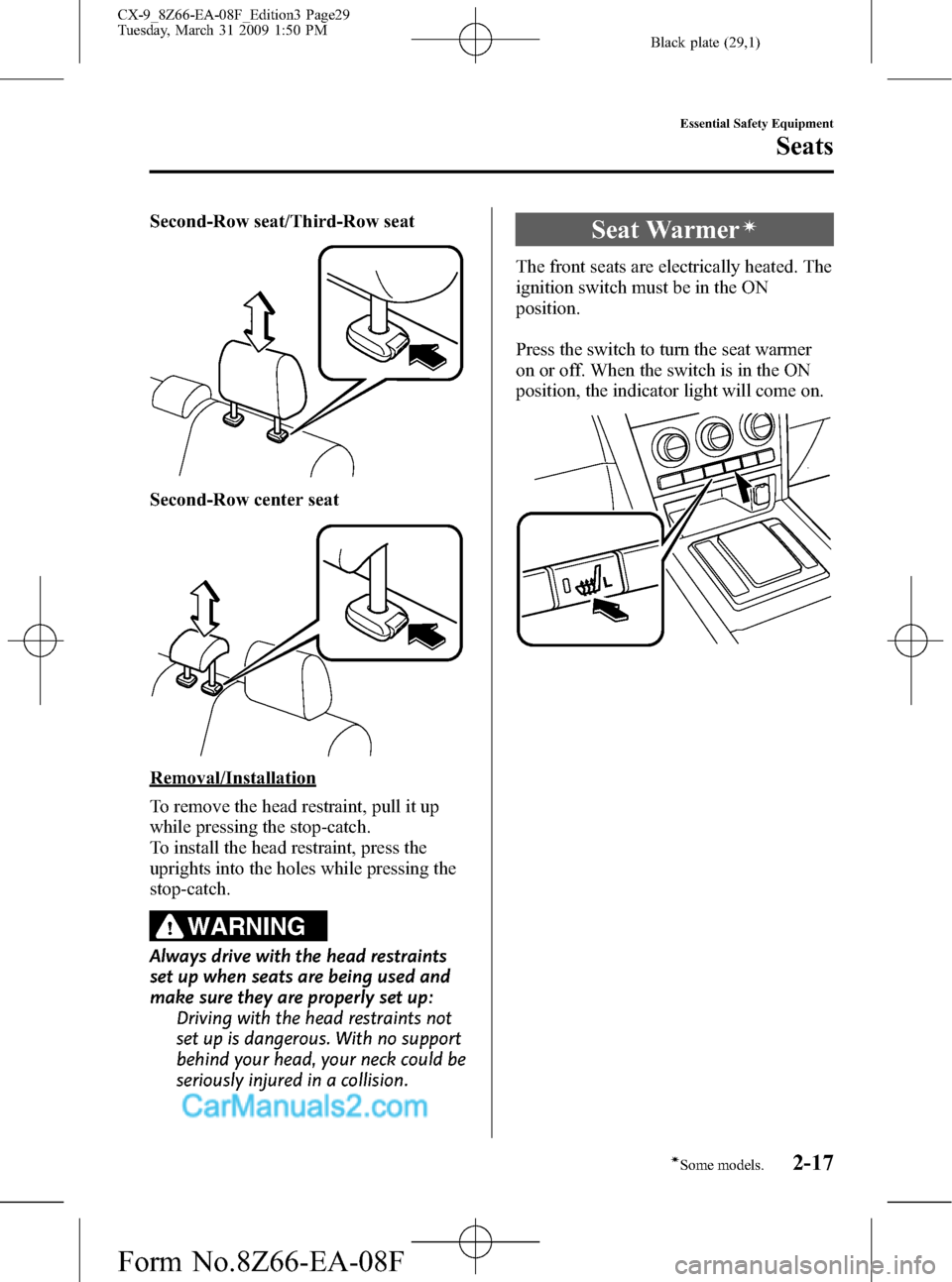
Black plate (29,1)
Second-Row seat/Third-Row seat
Second-Row center seat
Removal/Installation
To remove the head restraint, pull it up
while pressing the stop-catch.
To install the head restraint, press the
uprights into the holes while pressing the
stop-catch.
WARNING
Always drive with the head restraints
set up when seats are being used and
make sure they are properly set up:
Driving with the head restraints not
set up is dangerous. With no support
behind your head, your neck could be
seriously injured in a collision.
Seat Warmerí
The front seats are electrically heated. The
ignition switch must be in the ON
position.
Press the switch to turn the seat warmer
on or off. When the switch is in the ON
position, the indicator light will come on.
Essential Safety Equipment
Seats
2-17íSome models. CX-9_8Z66-EA-08F_Edition3 Page29
Tuesday, March 31 2009 1:50 PM
Form No.8Z66-EA-08F
Page 31 of 538
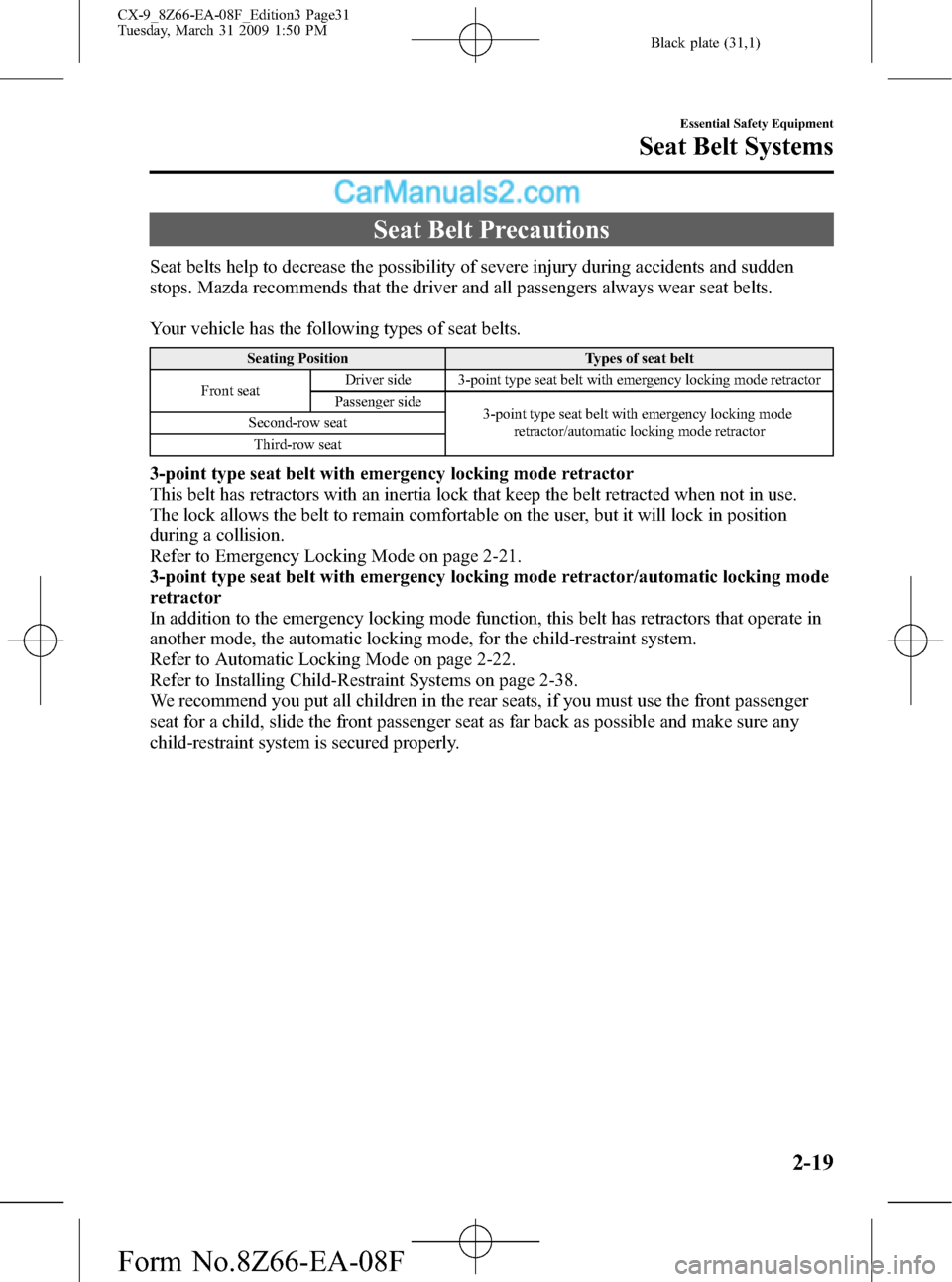
Black plate (31,1)
Seat Belt Precautions
Seat belts help to decrease the possibility of severe injury during accidents and sudden
stops. Mazda recommends that the driver and all passengers always wear seat belts.
Your vehicle has the following types of seat belts.
Seating Position Types of seat belt
Front seatDriver side 3-point type seat belt with emergency locking mode retractor
Passenger side
3-point type seat belt with emergency locking mode
retractor/automatic locking mode retractor Second-row seat
Third-row seat
3-point type seat belt with emergency locking mode retractor
This belt has retractors with an inertia lock that keep the belt retracted when not in use.
The lock allows the belt to remain comfortable on the user, but it will lock in position
during a collision.
Refer to Emergency Locking Mode on page 2-21.
3-point type seat belt with emergency locking mode retractor/automatic locking mode
retractor
In addition to the emergency locking mode function, this belt has retractors that operate in
another mode, the automatic locking mode, for the child-restraint system.
Refer to Automatic Locking Mode on page 2-22.
Refer to Installing Child-Restraint Systems on page 2-38.
We recommend you put all children in the rear seats, if you must use the front passenger
seat for a child, slide the front passenger seat as far back as possible and make sure any
child-restraint system is secured properly.
Essential Safety Equipment
Seat Belt Systems
2-19
CX-9_8Z66-EA-08F_Edition3 Page31
Tuesday, March 31 2009 1:50 PM
Form No.8Z66-EA-08F
Page 33 of 538
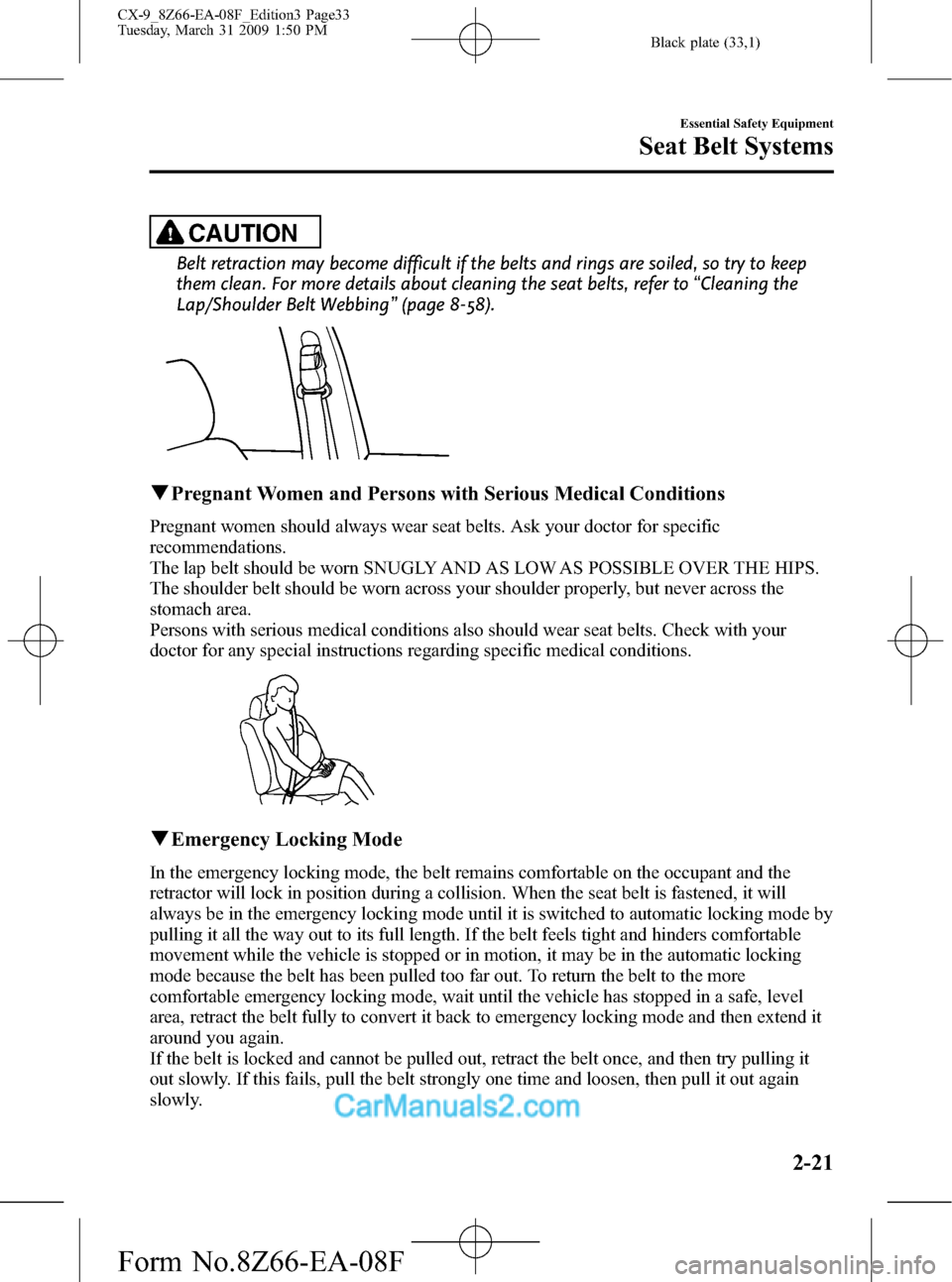
Black plate (33,1)
CAUTION
Belt retraction may become difficult if the belts and rings are soiled, so try to keep
them clean. For more details about cleaning the seat belts, refer to“Cleaning the
Lap/Shoulder Belt Webbing”(page 8-58).
qPregnant Women and Persons with Serious Medical Conditions
Pregnant women should always wear seat belts. Ask your doctor for specific
recommendations.
The lap belt should be worn SNUGLY AND AS LOW AS POSSIBLE OVER THE HIPS.
The shoulder belt should be worn across your shoulder properly, but never across the
stomach area.
Persons with serious medical conditions also should wear seat belts. Check with your
doctor for any special instructions regarding specific medical conditions.
qEmergency Locking Mode
In the emergency locking mode, the belt remains comfortable on the occupant and the
retractor will lock in position during a collision. When the seat belt is fastened, it will
always be in the emergency locking mode until it is switched to automatic locking mode by
pulling it all the way out to its full length. If the belt feels tight and hinders comfortable
movement while the vehicle is stopped or in motion, it may be in the automatic locking
mode because the belt has been pulled too far out. To return the belt to the more
comfortable emergency locking mode, wait until the vehicle has stopped in a safe, level
area, retract the belt fully to convert it back to emergency locking mode and then extend it
around you again.
If the belt is locked and cannot be pulled out, retract the belt once, and then try pulling it
out slowly. If this fails, pull the belt strongly one time and loosen, then pull it out again
slowly.
Essential Safety Equipment
Seat Belt Systems
2-21
CX-9_8Z66-EA-08F_Edition3 Page33
Tuesday, March 31 2009 1:50 PM
Form No.8Z66-EA-08F
Page 37 of 538
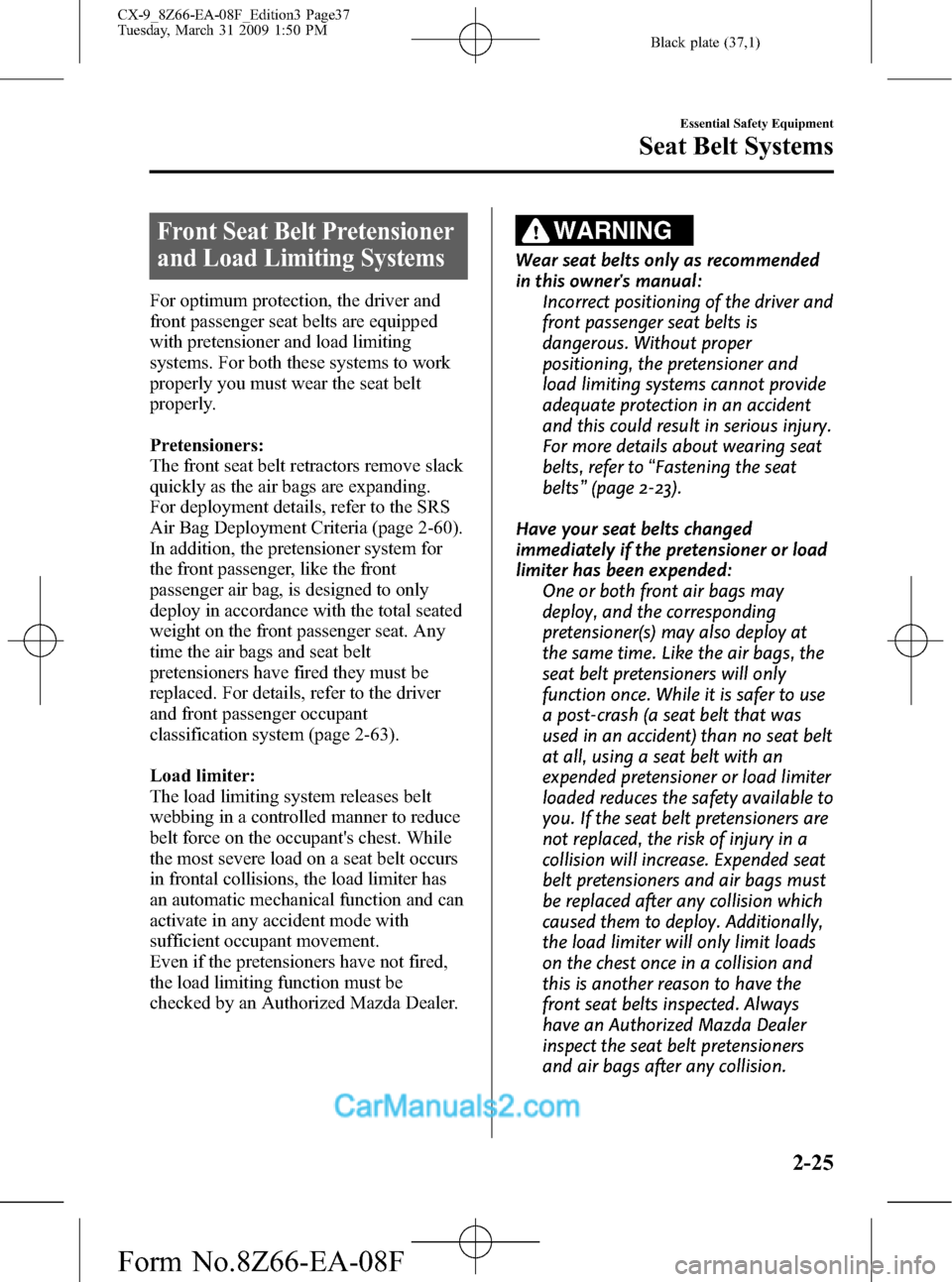
Black plate (37,1)
Front Seat Belt Pretensioner
and Load Limiting Systems
For optimum protection, the driver and
front passenger seat belts are equipped
with pretensioner and load limiting
systems. For both these systems to work
properly you must wear the seat belt
properly.
Pretensioners:
The front seat belt retractors remove slack
quickly as the air bags are expanding.
For deployment details, refer to the SRS
Air Bag Deployment Criteria (page 2-60).
In addition, the pretensioner system for
the front passenger, like the front
passenger air bag, is designed to only
deploy in accordance with the total seated
weight on the front passenger seat. Any
time the air bags and seat belt
pretensioners have fired they must be
replaced. For details, refer to the driver
and front passenger occupant
classification system (page 2-63).
Load limiter:
The load limiting system releases belt
webbing in a controlled manner to reduce
belt force on the occupant's chest. While
the most severe load on a seat belt occurs
in frontal collisions, the load limiter has
an automatic mechanical function and can
activate in any accident mode with
sufficient occupant movement.
Even if the pretensioners have not fired,
the load limiting function must be
checked by an Authorized Mazda Dealer.
WARNING
Wear seat belts only as recommended
in this owner's manual:
Incorrect positioning of the driver and
front passenger seat belts is
dangerous. Without proper
positioning, the pretensioner and
load limiting systems cannot provide
adequate protection in an accident
and this could result in serious injury.
For more details about wearing seat
belts, refer to“Fastening the seat
belts”(page 2-23).
Have your seat belts changed
immediately if the pretensioner or load
limiter has been expended:
One or both front air bags may
deploy, and the corresponding
pretensioner(s) may also deploy at
the same time. Like the air bags, the
seat belt pretensioners will only
function once. While it is safer to use
a post-crash (a seat belt that was
used in an accident) than no seat belt
at all, using a seat belt with an
expended pretensioner or load limiter
loaded reduces the safety available to
you. If the seat belt pretensioners are
not replaced, the risk of injury in a
collision will increase. Expended seat
belt pretensioners and air bags must
be replaced after any collision which
caused them to deploy. Additionally,
the load limiter will only limit loads
on the chest once in a collision and
this is another reason to have the
front seat belts inspected. Always
have an Authorized Mazda Dealer
inspect the seat belt pretensioners
and air bags after any collision.
Essential Safety Equipment
Seat Belt Systems
2-25
CX-9_8Z66-EA-08F_Edition3 Page37
Tuesday, March 31 2009 1:50 PM
Form No.8Z66-EA-08F
Page 38 of 538
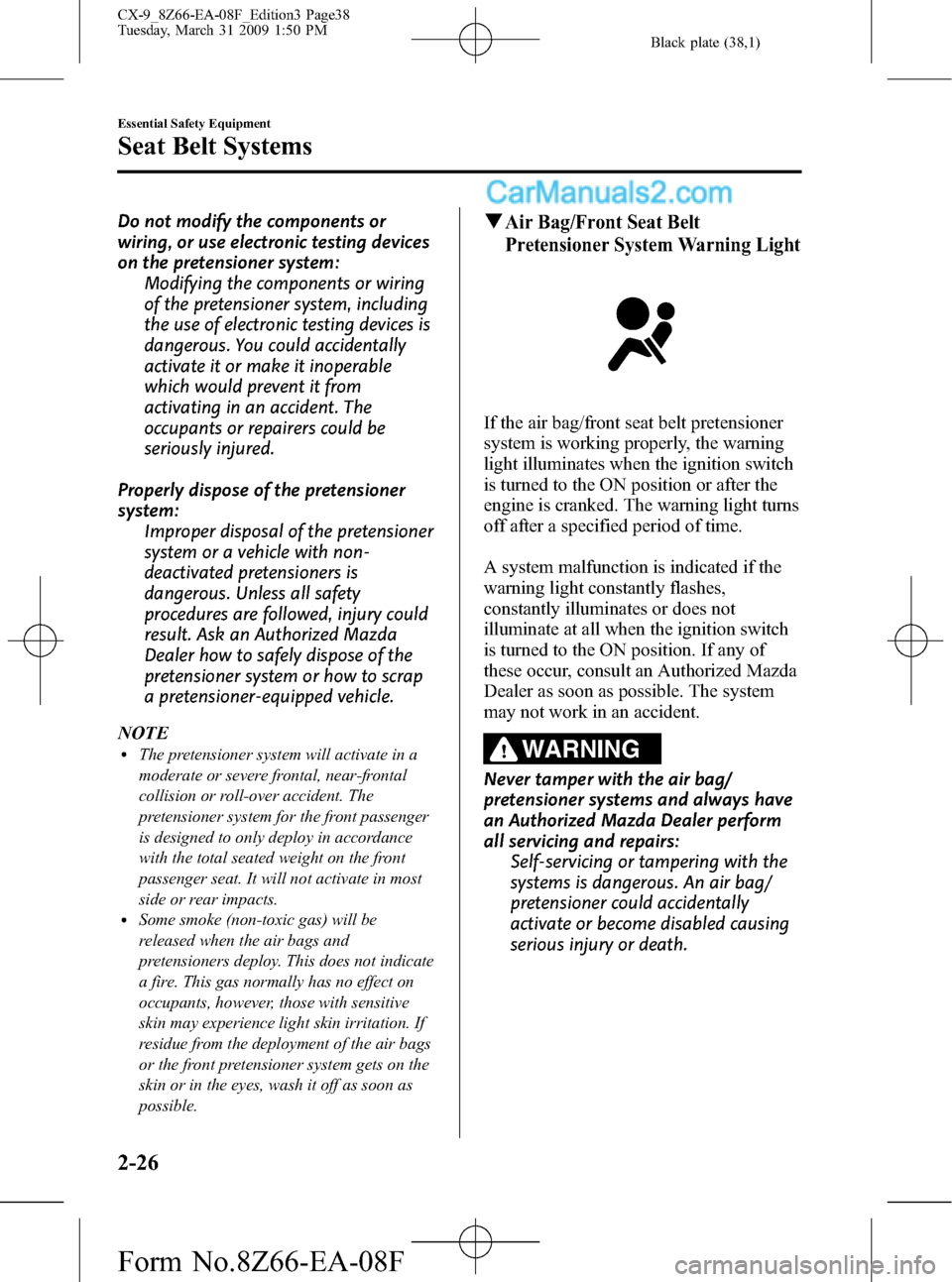
Black plate (38,1)
Do not modify the components or
wiring, or use electronic testing devices
on the pretensioner system:
Modifying the components or wiring
of the pretensioner system, including
the use of electronic testing devices is
dangerous. You could accidentally
activate it or make it inoperable
which would prevent it from
activating in an accident. The
occupants or repairers could be
seriously injured.
Properly dispose of the pretensioner
system:
Improper disposal of the pretensioner
system or a vehicle with non-
deactivated pretensioners is
dangerous. Unless all safety
procedures are followed, injury could
result. Ask an Authorized Mazda
Dealer how to safely dispose of the
pretensioner system or how to scrap
a pretensioner-equipped vehicle.
NOTE
lThe pretensioner system will activate in a
moderate or severe frontal, near-frontal
collision or roll-over accident. The
pretensioner system for the front passenger
is designed to only deploy in accordance
with the total seated weight on the front
passenger seat. It will not activate in most
side or rear impacts.
lSome smoke (non-toxic gas) will be
released when the air bags and
pretensioners deploy. This does not indicate
a fire. This gas normally has no effect on
occupants, however, those with sensitive
skin may experience light skin irritation. If
residue from the deployment of the air bags
or the front pretensioner system gets on the
skin or in the eyes, wash it off as soon as
possible.
qAir Bag/Front Seat Belt
Pretensioner System Warning Light
If the air bag/front seat belt pretensioner
system is working properly, the warning
light illuminates when the ignition switch
is turned to the ON position or after the
engine is cranked. The warning light turns
off after a specified period of time.
A system malfunction is indicated if the
warning light constantly flashes,
constantly illuminates or does not
illuminate at all when the ignition switch
is turned to the ON position. If any of
these occur, consult an Authorized Mazda
Dealer as soon as possible. The system
may not work in an accident.
WARNING
Never tamper with the air bag/
pretensioner systems and always have
an Authorized Mazda Dealer perform
all servicing and repairs:
Self-servicing or tampering with the
systems is dangerous. An air bag/
pretensioner could accidentally
activate or become disabled causing
serious injury or death.
2-26
Essential Safety Equipment
Seat Belt Systems
CX-9_8Z66-EA-08F_Edition3 Page38
Tuesday, March 31 2009 1:50 PM
Form No.8Z66-EA-08F
Page 50 of 538
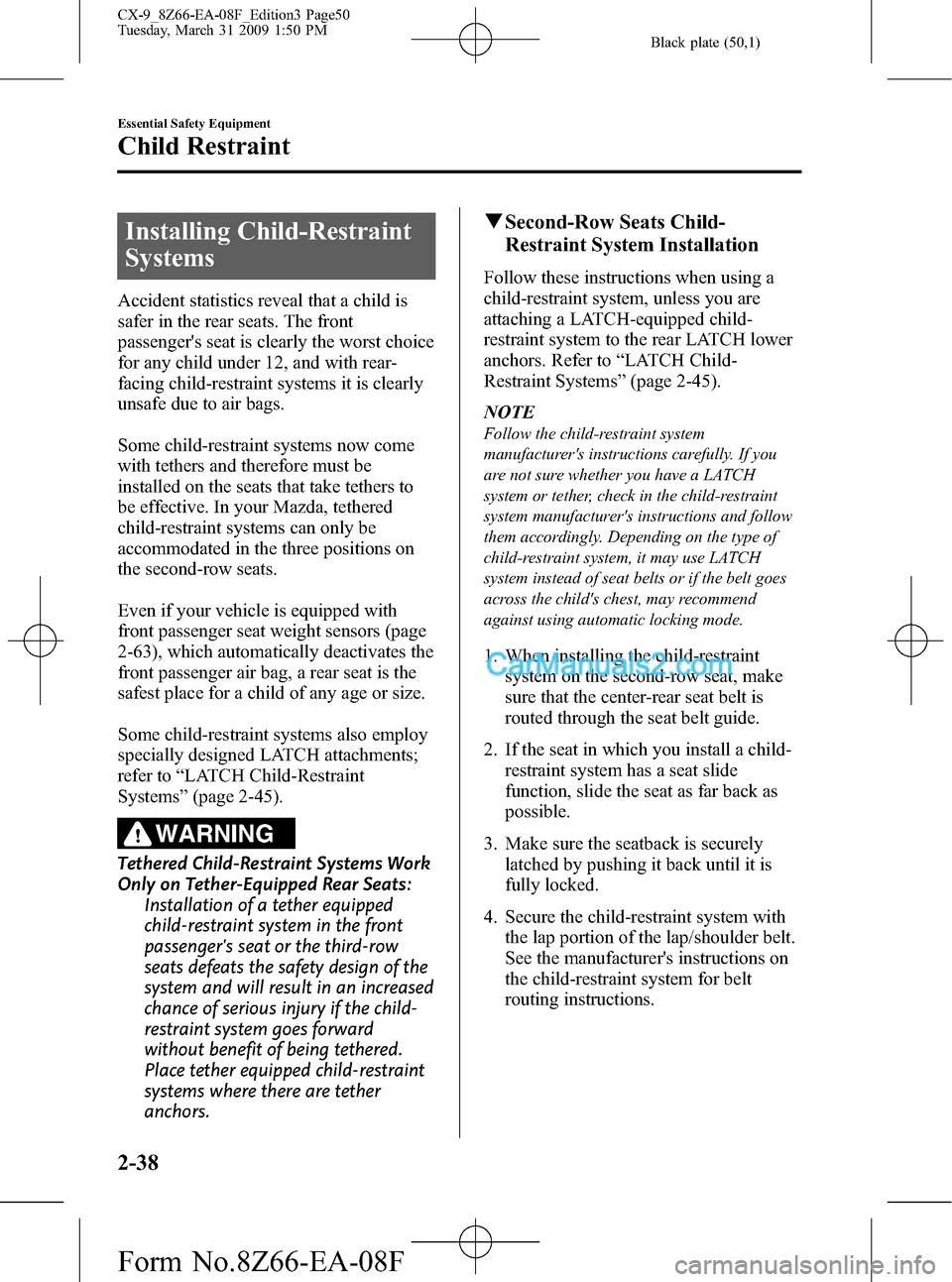
Black plate (50,1)
Installing Child-Restraint
Systems
Accident statistics reveal that a child is
safer in the rear seats. The front
passenger's seat is clearly the worst choice
for any child under 12, and with rear-
facing child-restraint systems it is clearly
unsafe due to air bags.
Some child-restraint systems now come
with tethers and therefore must be
installed on the seats that take tethers to
be effective. In your Mazda, tethered
child-restraint systems can only be
accommodated in the three positions on
the second-row seats.
Even if your vehicle is equipped with
front passenger seat weight sensors (page
2-63), which automatically deactivates the
front passenger air bag, a rear seat is the
safest place for a child of any age or size.
Some child-restraint systems also employ
specially designed LATCH attachments;
refer to“LATCH Child-Restraint
Systems”(page 2-45).
WARNING
Tethered Child-Restraint Systems Work
Only on Tether-Equipped Rear Seats:
Installation of a tether equipped
child-restraint system in the front
passenger's seat or the third-row
seats defeats the safety design of the
system and will result in an increased
chance of serious injury if the child-
restraint system goes forward
without benefit of being tethered.
Place tether equipped child-restraint
systems where there are tether
anchors.
qSecond-Row Seats Child-
Restraint System Installation
Follow these instructions when using a
child-restraint system, unless you are
attaching a LATCH-equipped child-
restraint system to the rear LATCH lower
anchors. Refer to“LATCH Child-
Restraint Systems”(page 2-45).
NOTE
Follow the child-restraint system
manufacturer's instructions carefully. If you
are not sure whether you have a LATCH
system or tether, check in the child-restraint
system manufacturer's instructions and follow
them accordingly. Depending on the type of
child-restraint system, it may use LATCH
system instead of seat belts or if the belt goes
across the child's chest, may recommend
against using automatic locking mode.
1. When installing the child-restraint
system on the second-row seat, make
sure that the center-rear seat belt is
routed through the seat belt guide.
2. If the seat in which you install a child-
restraint system has a seat slide
function, slide the seat as far back as
possible.
3. Make sure the seatback is securely
latched by pushing it back until it is
fully locked.
4. Secure the child-restraint system with
the lap portion of the lap/shoulder belt.
See the manufacturer's instructions on
the child-restraint system for belt
routing instructions.
2-38
Essential Safety Equipment
Child Restraint
CX-9_8Z66-EA-08F_Edition3 Page50
Tuesday, March 31 2009 1:50 PM
Form No.8Z66-EA-08F
Page 52 of 538

Black plate (52,1)
WARNING
Use the tether and tether anchor only
for a child-restraint system:
Using the tether or tether anchor to
secure anything but a child-restraint
system is dangerous. This could
weaken or damage the tether or
tether anchor and result in injury.
Always route the tether strap between
the head restraint and the seatback:
Routing the tether strap on top of the
head restraint is dangerous. In a
collision the tether strap could slide
off the head restraint and loosen the
child-restraint system. The child-
restraint system could move which
may result in death or injury to the
child.
Always attach the tether strap to the
correct tether anchor position:
Attaching the tether strap to the
incorrect tether anchor position is
dangerous. In a collision, the tether
strap could come off and loosen the
child-restraint system. If the child-
restraint system moves it could result
in death or injury to the child.
qThird-Row Seats Child-Restraint
System Installation
The third-row seats cannot accommodate
LATCH-type child-restraint systems or
tethers, therefore these systems must be
installed on the other seat positions such
as the second-row seat. If this not
possible, LATCH-type child-restraint
systems should be installed to a third-row
seat using the seat belt depending on
whether the child-restraint manufacturer
allows their use without LATCH
attachments and tether anchors.
Follow these manufacturer's instructions
when using a child-restraint system.
NOTE
Follow the child-restraint system
manufacturer's instructions carefully.
Depending on the type of child-restraint
system, it may not employ seat belts which are
in automatic locking mode.
1. Secure the child-restraint system with
the lap portion of the lap/shoulder belt.
See the manufacturer's instructions on
the child-restraint system for belt
routing instructions.
2-40
Essential Safety Equipment
Child Restraint
CX-9_8Z66-EA-08F_Edition3 Page52
Tuesday, March 31 2009 1:50 PM
Form No.8Z66-EA-08F
Page 53 of 538
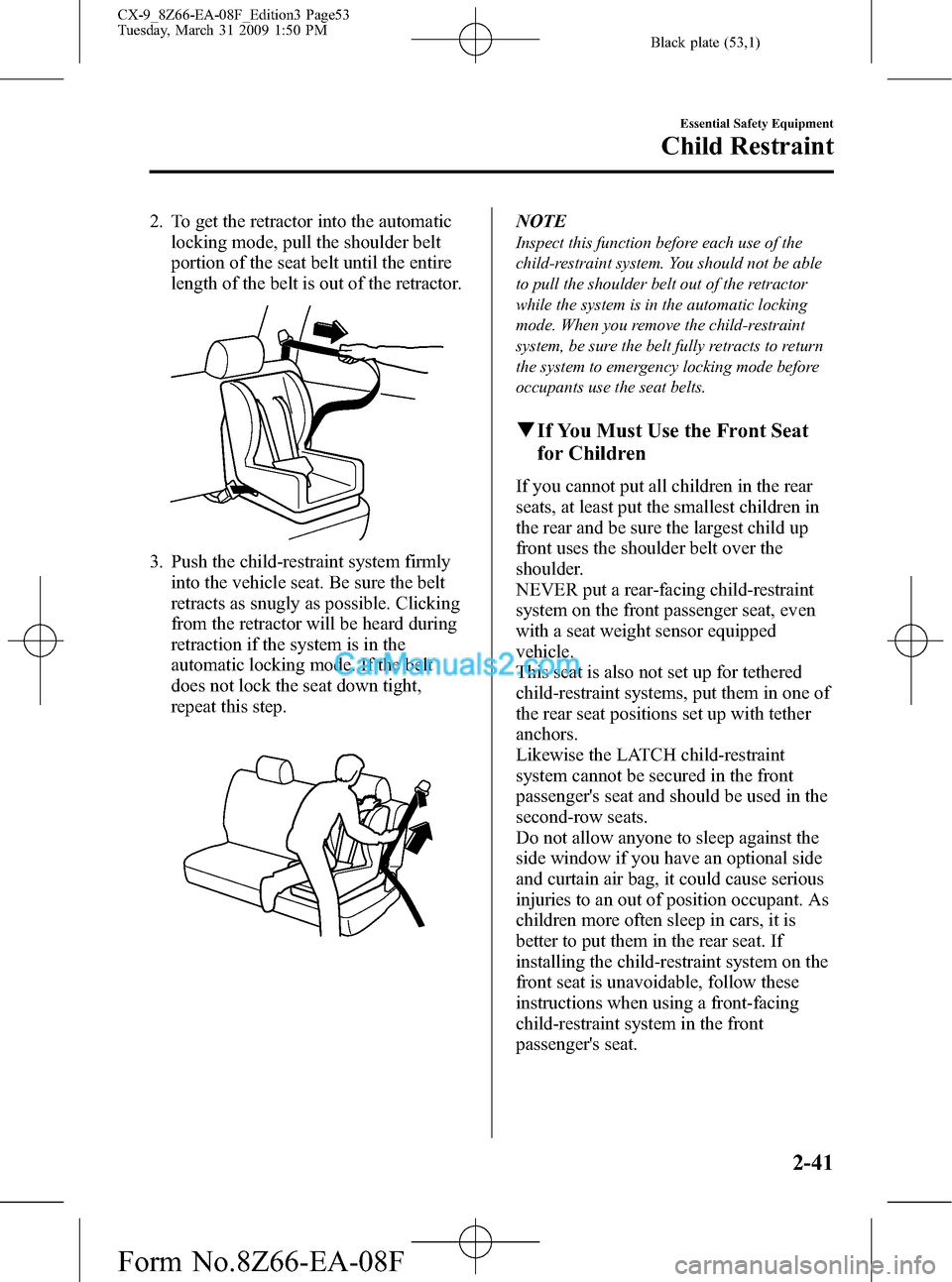
Black plate (53,1)
2. To get the retractor into the automatic
locking mode, pull the shoulder belt
portion of the seat belt until the entire
length of the belt is out of the retractor.
3. Push the child-restraint system firmly
into the vehicle seat. Be sure the belt
retracts as snugly as possible. Clicking
from the retractor will be heard during
retraction if the system is in the
automatic locking mode. If the belt
does not lock the seat down tight,
repeat this step.
NOTE
Inspect this function before each use of the
child-restraint system. You should not be able
to pull the shoulder belt out of the retractor
while the system is in the automatic locking
mode. When you remove the child-restraint
system, be sure the belt fully retracts to return
the system to emergency locking mode before
occupants use the seat belts.
qIf You Must Use the Front Seat
for Children
If you cannot put all children in the rear
seats, at least put the smallest children in
the rear and be sure the largest child up
front uses the shoulder belt over the
shoulder.
NEVER put a rear-facing child-restraint
system on the front passenger seat, even
with a seat weight sensor equipped
vehicle.
This seat is also not set up for tethered
child-restraint systems, put them in one of
the rear seat positions set up with tether
anchors.
Likewise the LATCH child-restraint
system cannot be secured in the front
passenger's seat and should be used in the
second-row seats.
Do not allow anyone to sleep against the
side window if you have an optional side
and curtain air bag, it could cause serious
injuries to an out of position occupant. As
children more often sleep in cars, it is
better to put them in the rear seat. If
installing the child-restraint system on the
front seat is unavoidable, follow these
instructions when using a front-facing
child-restraint system in the front
passenger's seat.
Essential Safety Equipment
Child Restraint
2-41
CX-9_8Z66-EA-08F_Edition3 Page53
Tuesday, March 31 2009 1:50 PM
Form No.8Z66-EA-08F